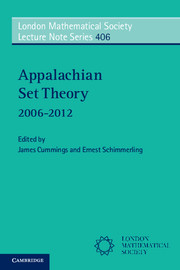Book contents
- Frontmatter
- Contents
- Contributors
- Introduction
- 1 An introduction to ℙmax forcing
- 2 Countable Borel equivalence relations
- 3 Set theory and operator algebras
- 4 A tutorial on Set Mapping Reflection
- 5 An introduction to hyperlinear and sofic groups
- 6 Aronszajn trees and the SCH
- 7 Iterated forcing and the Continuum Hypothesis
- 8 Short extender forcing
- 9 The complexity of classi?cation problems in ergodic theory
- 10 On the strengths and weaknesses of weak squares
- 11 Proper forcing remastered
- 12 Set theory and von Neumann algebras
- 13 The HOD Dichotomy
7 - Iterated forcing and the Continuum Hypothesis
Published online by Cambridge University Press: 05 December 2012
- Frontmatter
- Contents
- Contributors
- Introduction
- 1 An introduction to ℙmax forcing
- 2 Countable Borel equivalence relations
- 3 Set theory and operator algebras
- 4 A tutorial on Set Mapping Reflection
- 5 An introduction to hyperlinear and sofic groups
- 6 Aronszajn trees and the SCH
- 7 Iterated forcing and the Continuum Hypothesis
- 8 Short extender forcing
- 9 The complexity of classi?cation problems in ergodic theory
- 10 On the strengths and weaknesses of weak squares
- 11 Proper forcing remastered
- 12 Set theory and von Neumann algebras
- 13 The HOD Dichotomy
Summary
The ninth Appalachian Set Theory workshop was held at the Fields Institute in Toronto on May 29–30, 2009. The lecturers were Todd Eisworth and Justin Moore. As a graduate student David Milovich assisted in writing this chapter, which is based on the workshop lectures.
The notes which follow reflect the content of a two day tutorial which took place at the Fields Institute on 5/29 and 5/30 in 2009. Most of the content has existed in the literature for some time (primarily in the original edition of [10]) but has proved difficult to read and digest for various reasons. The only new material contained in these lectures concerns the notion of a fusion scheme presented in Sections 6 and 7 and even this has more to do with style than with mathematics. Our presentation of the iteration theorems follows [4]. The k-iterability condition is a natural extrapolation of what appears in [4] and [5], where the iteration theorem for the ℵ0-iterability condition is presented (with a weakening of < ω1-properness). The formulation of complete properness is taken from [8]. We stress, however, these definitions and theorems are really technical and/or stylistic modifications of the theorems and definitions of Shelah presented in [10]. Those interested in further reading on the topic of the workshop should consult: [1], [4], [5], [8], [10], and [12]. We would like to thank Ilijas Farah, Miguel Angel Mota, Paul Shafer, and the anonymous referee for their careful reading and suggesting a number of improvements.
- Type
- Chapter
- Information
- Appalachian Set Theory2006–2012, pp. 207 - 244Publisher: Cambridge University PressPrint publication year: 2012
- 1
- Cited by



